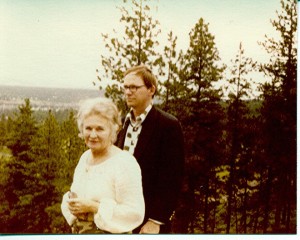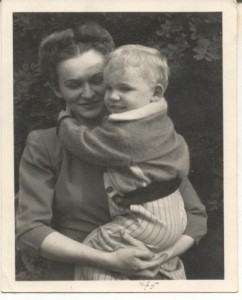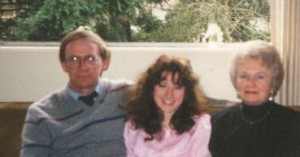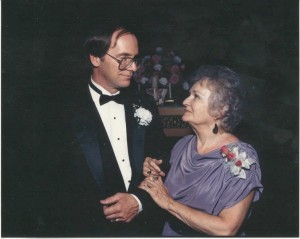“Never, ever, ever give up.” Thus said Winston Churchill in October 1941, in the shortest of his speeches. As the WW II statesman applied this maxim famously to political life, so too might we apply the principle of perseverance to our personal lives when the warfare is spiritual in form.
Perseverance works in tandem with the cardinal virtue of fortitude as we “fight the good fight” to the finish, whatever situation we may face. Even within the family, perseverance is essential. So it proved to be in the case of my dying mother, more than a dozen years ago.
Ever since my return to the sacraments – or rather my re-conversion at age 28 to my Catholic upbringing – I’d been trying with no visible success to coax, cajole, convince by argument, and otherwise persuade my mother, Ruth Struble, to accept the Gospel. Mine was the zealotry of the neophyte. After some years I came to the conclusion that until her heart softened it would be best not to push the religious issue. Bulldozing Mom was not, I realized, the same as perseverance tempered with patience, meanwhile preaching by example.
Mom was a very independent widow, willing to try new activities on her own initiative, such as skiing, woodworking, jewelry making, and other crafts. Also she had a successful 20-year career in the public schools system, a nice house well-furnished and fully paid for, and a classy manner that won her lots of friends. Mom was, as she once told me, “a survivor.” I think she would have agreed with my qualifier, “in this world.”
She was grateful for her blessings here below, but balked at the idea of repentance for sins or having to face a personal accounting someday. Mom preferred to think of harmony with the Universe as distinguished from the God of Sacred Scripture.
What worried me most was that Mom seemed to be wagering her eternal destiny on a gamble that the Bible is mistaken. If men and women can work their way into heaven we might as well topple the two pillars of Catholic doctrine, Sacred Scripture and Sacred Tradition. Both tell us of God’s expectation that good works be accompanied by faith in the Savior, and sanctified by that faith.
For by grace you have been saved, through faith; and that not from yourselves, for it is the gift of God; not as the outcome of works, lest anyone may boast (Ephesians 2: 8-9).
Then during December, 1999, alas, Mom was in her hospital bed with about a week to live. As the last days of the 20th century wound down, so did her earthly frame. I could only catch glimpses of the events taking place in Mom’s soul, but this story is about the spark of faith I did observe.
Ours was a two parent, two child family. Dad was Catholic; Mom had been baptized Methodist as a girl, yet for most of my childhood she attended Sunday mass regularly. After Dad’s death in 1967, Mom drifted further and further from Christianity, as did my sister, Charline, and I. Yet there is one area where I’m certain Mom never flagged or failed — in her unconditional love for me, her only son.
As far as I know Charline remains far away from any sort of allegiance to Christianity. Years ago, when last we spoke, my sister was militantly opposed to Catholicism, a stance nurtured by her years in the Psychology Dept. at the University of Washington. Since mid-1971 I myself have been strongly committed to the Roman Catholic faith and to the sacraments.
So when I went to Mom’s side in the hospital, I felt that God and I had our work cut out for us. Added to the difficulty were the troublesome roles of my sister and Mom’s niece, Karen. I had been fairly close to my cousin Karen until she became a Buddhist. Even thereafter we had good rapport during occasional family get-togethers. Like my sister, Karen was strong willed and had her own ideas about how Mom should go about the business of dying.
The greatest sin is, Karen told me, to divert a person from their chosen path. Here Buddhism and deathbed reconciliation with Christ seem utterly at variance. Mom’s spiritual conversion was precisely what I had long prayed for, and what the great commission (Matthew 28:19-20) tells Christians to work for. To make one last effort was my duty to God and to the lady who bore me and who loved me through thick and thin. I was less concerned about the Buddhist’s worst sin than the sin of omission described in the Bible:
If anyone does not take care of his own, and especially of his household, he has denied the faith and is worse than an unbeliever (1 Timothy 5:3-4, 8).
I wasn’t about to defer to Karen’s counsel and let Mom jump off into eternity without a parachute. But Karen’s advantage was that I lived an hour and a half away from the hospital, including an hour ferry boat ride across Puget Sound. Moreover I was teaching school full-time. Karen and my sister did not have to deal with the ferries and were out of the labor force. They used the leisure time to spend hours in the hospital room on a daily basis.
My sister Charline attended Catholic schools through High School, and later took a degree from the University of Washington with a major in Psychology. There, like many if not most large secular universities, the anti-Christian spirit is strong – even dominant. Neither I nor my sister emerged from the experience of this campus unscathed. While immersed in that environment, my own spiritual life degenerated radically. From the same campus several years later, Charline came forth firmly pagan. The collegiate reinforcement of her spiritual rebellion, bolstered by intellectual pride in her election to Phi Beta Kappa, were watershed events. They were intoxicating memories that fortified a hostility in her heart toward Christianity and Christians. Since my religious conversion in 1970, the brother-sister relationship between us came increasingly to resemble the Thirty Years War.
I burden the reader with these details because my mother’s belated conversion confirms that Yogi Berra is right. Even in seemingly hopeless circumstances, “it ain’t over till it’s over.”
During Mom’s last week the hospital’s Catholic chaplain came to visit three times, at my request. He chatted amiably with Mom during his first visit when both my sister and I were absent. But before the chaplain could turn the conversation to spiritual matters a friend of hers arrived for a visit, and Father excused himself in the expectation of returning later. On the second visit, however, my sister — who had power of attorney — turned the priest away from the room. Mom wasn’t consulted; I was at work. On the chaplain’s third visit, I was down the hall and arrived just in time to see him talking with my sister and her husband outside the curtain to Mom’s room. Charline had just escorted him from the room and pointedly asked him to explain why he was there again. He was in the process of telling them “your brother invited me…” when I stepped up and greeted Father enthusiastically.
By then Mom had been in a coma for some hours and I asked Father if he would be willing to give her a blessing. “Yes, of course,” he said, or words to that effect. But Charline opposed the idea adamantly, and a brief verbal exchange occurred between my sister and me. Her position was a condensed version of Karen’s: Mom wasn’t interested, she claimed. Under the pressure of the moment I neglected to say that Mom voiced no objection to Father’s first visit. Instead I tried vainly to win the chaplain’s entry by alluding to Mom’s recently rekindled interest in faith–which is the focus of this story. Before I got very far, however, the nurse appeared on the scene and took Charline’s side.
My brother in law, Tom Fine, then took charge. He had played tight end on Notre Dame’s national championship football team of 1973 and had become a supervisor at Boeing. At that moment he may have been the most able arbitrator since the Great Compromiser, Henry Clay, foisted the Fugitive Slave Law upon the North. Tom seized Father’s hand, cordially thanked him for coming, and asked if Fr. could pray for Mom at some other location.
This final departure by the chaplain took place a week after his first visit. In the meantime God showed that He has more ways than one to accomplish his purposes. During seven fateful days, I believe I saw Mom emerge from agnosticism into the embrace of a merciful God. More than all her good works and excellent qualities, a flash of faith exhibited during her last week gives me hope and confidence of seeing my mother again in paradise.
My wife, Jeryl, has an insight here. People react in radically different ways to suffering, she says. Just as boiling water hardens the egg but softens the carrot, so suffering embitters some people but softens others. The experience of suffering softened Mom.
One evening in the hospital Mom must have noticed my own anguish, for she said to me, “I’m not suffering that much.” I was led to reply, “I would feel a lot better if I could hear you pray.” She responded, “you think I haven’t been praying?” I was afraid to ask whom she was praying to, for fear of hearing about the Universe again, so I said, “I’d still feel so much better if you’d say a prayer with me. How about a choice” I asked? “There’s the Our Father, the Hail Mary, the Glory Be, or the Act of Contrition.” Without further prompting she began saying the Lord’s Prayer, clearly articulating Jesus’ words in the strongest voice she had managed in days. I was thrilled to follow along.
After the prayer we talked about how she used to say nightly prayers with me as a boy. “Yes I did,” she said tenderly. I think it was at that point we began to reminisce about our escape from a mountain wilderness.
Our high country hike decades ago, was a longstanding joke between us. The infamous trek was back in 1967; Dad had just died and I had convinced Mom that a major getaway was just what she needed. With Buff, the old family beagle, she and I took a trail in the Cascade Mts. that led to an alpine lake several miles from the trailhead As we left the car behind, the weather was pleasant and the scenery inviting. We had a couple of sleeping bags, a 22 rifle, enough food for an overnighter, and a geographic goal–make it to the lake and find a place to camp before nightfall.
By the time we reached the lake it was getting dark and raining heavily. We had checked the weather report which said only 10% chance of rain. I think all 10% came down on our heads that night. We had no tent, the sleeping bags soon became wet sponges, and neither of us were woods-wise. We did perceive that a nighttime attempt at the steep switchbacks on the trail would be suicidal. On top of that we were in bear country, and the pathetic inadequacy of old Buff’s teeth and our 22 Winchester came to mind with every mysterious sound emerging from the dark and mysterious forest.
At dawn it was still raining, and we carried our sodden selves and gear back down the mountain. The sight of that car waiting at the trailhead was indescribably sweet and remained fixed in both of our memories. Three decades later in the hospital the memory served as a useful metaphor.
“Remember how wonderful your car looked,” I asked? “Yes,” Mom said. “God will take you by the hand if you only let Him,” I told her, “and He’ll lead you out of the woods again. And to something even sweeter than that car.” I think that sylvan metaphor was a godsend, just waiting to serve at this critical spiritual opportunity.
The following day I was able to be alone again with Mom for a few hours. Already it was requiring extra effort for her to talk. When I offered to read to her, she assented. I proposed three or four options, one of which was the Bible. When she expressed no preference, I gently said, “how about the Bible?” She agreed. Removing a small New Testament from my briefcase, I opened to the Gospel of John. After reading the prologue, John 1:1-18, I asked her to let me say a few prayers. “You just listen,” I said. Slowly and reverently I prayed the Lord’s Prayer, Hail Mary, Act of Contrition, Memorare, Hail Holy Queen, and the Jesus prayer, “Lord Jesus Christ, Son of the living God, have mercy on me a sinner.”
“That was very soothing,” said she. A few years earlier she wouldn’t have let me get half way through the Bible reading without complaining, much less through several prayers.
The following Wednesday I got news while in the classroom that they had taken Mom off all heart medication and were substituting a morphine drip. She might last hours they said, or at most a day or two. When Daniel, my six year old son, and I got to the hospital Mom was asleep. Later when my wife, Jeryl, and daughter, Katie, arrived, Mom was fading in and out of a restless sleep, but still able to understand and with effort to greet visitors. As it turned out, she had about two or three hours left before lapsing into a coma. Meanwhile, Charline and Tom went out to dinner and Jeryl asked Karen if she wanted to stay with us during a rosary we wanted to say as a family. Karen replied in the negative and indicated that she was opposed to saying the rosary at all, and urged Jeryl to let Mom follow her own path.
A few minutes later, Daniel, stepped opportunely on my wife’s foot. Jeryl let out a yelp. Seizing the incident as a pretext, I asked Karen to take Daniel down the hall for a walk. Jeryl, my daughter, Katie, and I then prayed the Sorrowful Mysteries of the rosary with Mom.
Just finishing the rosary was severe spiritual combat, in that Karen returned midway and paced into the room two or three times with obvious agitation, looking askance at the rosary in my hands and grimacing. Next, Karen gave us a frantic hand signal to stop when she noticed Charline and Tom returning. We just had time to finish the fourth decade before they came through the curtain. I asked them if they would like to join in on the fifth decade. Instead Charline stood at the door and glared angrily, rendering my wife speechless, and leaving my daughter (Mom’s ten year old granddaughter) and me to finish the rosary aloud.
This fifth decade may have been crucial because it was the only time during the rosary that Mom managed audible words; her words were these, “I do believe.” One of the prayers of the rosary that Mom must have heard goes like this: “O my Jesus, forgive us our sins, save us from the fires of hell. Lead all souls to heaven, especially those who have most need of Thy mercy.”
Tom did sterling service – afterwards incurring his wife’s anger – because during the rosary he stayed in the room and stroked Mom supportively. His presence may have been decisive in keeping Charline from making a scene or interrupting the spiritual moment for Mom.
In Boston, in the 1970s, I once heard a homily delivered by a priest in his golden years. Don’t wait for the last moment to get right with the Lord, he advised the congregation sagely. “In all my years as a priest,” Father said, “I have yet to see even one deathbed conversion.”
Yet in the case of my own mother, though it took a devil of a row, I do believe that I was privileged to see that rare and priceless wonder.







